必修五Unit3 语法学案Microsoft Word 文档
高二英语必修五_Unit3Grammar公开课学案

Unit3Grammar公开课学案Guided Learning PlanBook5Unit3GrammarThe Past Participle as the AdverbialI Lead in1. Guessing game: Find something to match the riddles(猜谜)① W hen heated, I’ll turn into gas, what am I?②If taken half, I will leave nothing, what number am I?③Made of gold, I often live on the woman's finger, what am I?2.What can you find?① When heated(过去分词), water (主语) turns into gas.② If taken half, 8 will leave nothing.③ Made of gold, rings often live on the woman's finger.句子主语和这些过去分词的关系?(主动/被动)ⅡPresentationTask1 1. Can you find the following passive sentences in the reading passage?①(worry about)the journey, I was unsettled for the first few days.②(hit ) by a lack of fresh air,my head ached.③(exhaust) , I slid into bed and fell fast asleep.2. Fill in the blanks.①(see) from space, the earth looks like a big blue ball.②(move) by the film, he started crying.③(heat), water changes into steam.④(defeat) again, he didn’t lose heart.⑤ The professor went into the study, (follow) by his wife.3. Join the conjunction of the proper adverbial clause.① Worried about the journey, I was unsettled for the first few days.② Seen from space, the earth looks like a big blue ball.③ Heated, water changes into steam.④Defeated again, he didn’t lose heart.⑤ The professor went into the study, followed by his wife.Summary1:过去分词作状语,可以表示_______ 、_______ 、_____ __ 、_______ 、______________ 等,主句的主语与过去分词构成了逻辑上的______ 关系,表示动作已。
必修五book5unit3课程教案全单元精品学案.doc
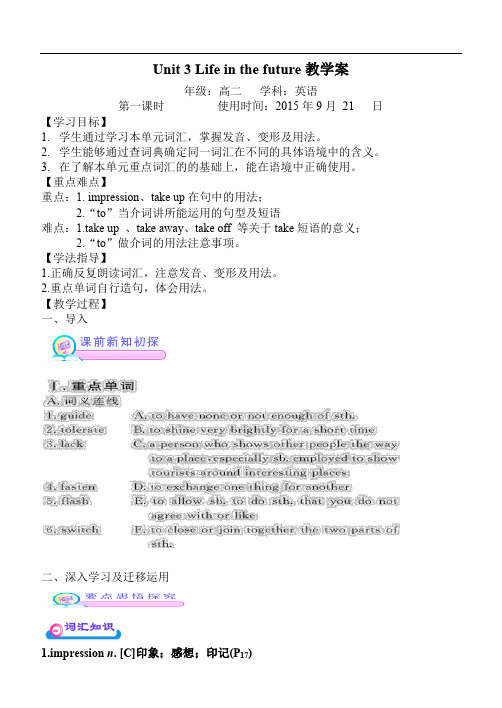
Unit 3 Life in the future教学案年级:高二学科:英语第一课时使用时间:2015年9月21 日【学习目标】1.学生通过学习本单元词汇,掌握发音、变形及用法。
2.学生能够通过查词典确定同一词汇在不同的具体语境中的含义。
3.在了解本单元重点词汇的的基础上,能在语境中正确使用。
【重点难点】重点:1. impression、take up在句中的用法;2.“to”当介词讲所能运用的句型及短语难点:1.take up 、take away、take off 等关于take短语的意义;2.“to”做介词的用法注意事项。
【学法指导】1.正确反复朗读词汇,注意发音、变形及用法。
2.重点单词自行造句,体会用法。
【教学过程】一、导入二、深入学习及迁移运用1.impression n. [C]印象;感想;印记(P17)▶What was your first impression of London?你对伦敦的第一印象是什么?▶She made a good impression on his mother.她给他母亲留下了很好的印象。
▶I was under the impression that you hadn’t visited the city before, was I right?我以为你以前不曾到过该市,对不对?▶My father impressed on me the value of hard work.我父亲让我记住努力工作的重要性。
用impress的适当形式填空①I was very __________ with her performance.②I had a very good ___________ of him.③She always wears a gentle and warm smile, which is ___________.2.take up拿起;接受;开始从事;继续;占去(时间或空间)【原句】I still cannot believe that I am taking up this prize that I won last year.(P17) 我还是无法相信我是在接受去年获得的这个奖励。
2021-2022学年人教版高中英语必修三教学案:Unit 5 Section 3 Word版含答案
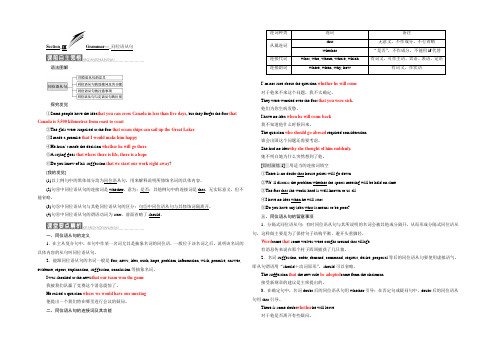
Section_ⅢGrammar—_同位语从句语法图解探究发觉①Some people have the idea that you can cross Canada in less than five days, but they forget the fact that Canada is 5,500 kilometres from coast to coast.②The girls were surprised at the fact that ocean ships can sail up the Great Lakes.③I made a promise that I would make him happy.④He hasn't made the decision whether he will go there.⑤A saying goes that where there is life, there is a hope.⑥Do you know of his suggestion that we start our work right away?[我的发觉](1)以上例句中的黑体部分均为同位语从句,用来解释说明所修饰名词的具体内容。
(2)句④中同位语从句的连接词是whether,意为:是否;其他例句中的连接词是that,无实际意义,但不能省略。
(3)句⑤中同位语从句与其他同位语从句的区分:句⑤中同位语从句与其修饰词隔离开。
(4)句⑥中同位语从句的谓语动词为start,前面省略了should。
一、同位语从句的定义1.在主从复合句中,在句中作某一名词尤其是抽象名词的同位语,一般位于该名词之后,说明该名词的具体内容的从句叫同位语从句。
2.能跟同位语从句的名词一般是fact, news, idea, truth, hope, problem, information, wish, promise, answer, evidence, report, explanation, suggestion, conclusion等抽象名词。
外研版高中英语必修5教案Module 3 Grammar
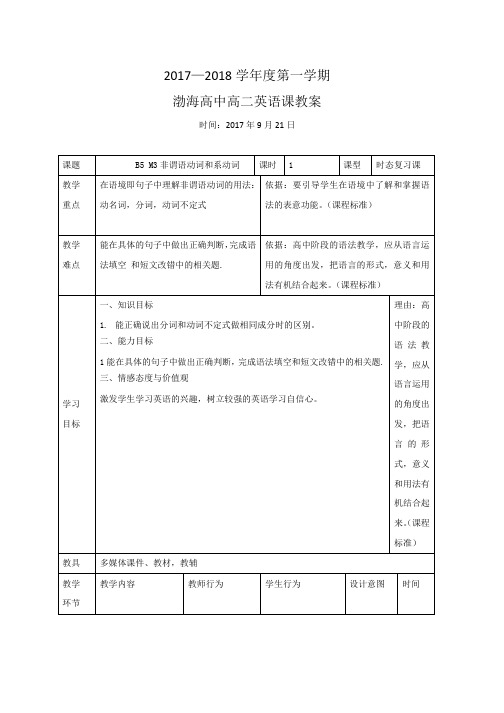
学习
目标
一、知识目标
1.能正确说出分词和动词不定式做相同成分时的区别。
二、能力目标
1能在具体的句子中做出正确判断,完成语法填空和短文改错中的相关题.
三、情感态度与价值观
激发学生学习英语的兴趣,树立较强的英语学习自信心。
检测学生自主学习情况,发现问题,解决问题。
10分钟
3.
做议讲评
1跟进巩固提升训练习题
1教师布置巩固提升习题,填空和改错
1全体学生独立完成巩固提升习题,小组讨论,小组展示,讨论,达成共识
进一步巩固训练,完成能力目标1,
15分钟
4.
总结提升
总结本课学习内容
教师鼓励学生总结本课内容,必要时补充
学生总结本课所学的知识点,包括现在完成时的基本用法,标志性时间状语,固定句型。
1或锻炼学生解读当堂学习目标2学生抢答教师提出的问题,回答正确可为小组加分。
调动学生自主预习英语的积极性,检测学生自主学习情况,完成知识目标1, ,
3分钟
2.
承接结果
核对自主学习任务中布置的习题答案。
教师监控学生展示讨论过程,必要时查缺补漏,适时补充。
一名学生展示自主作业习题,其他学生核对答案,提出质疑,讨论,最后达成共识。
2017—2018学年度第一学期
渤海高中高二英语课教案
时间:2017年9月21日
课题
B5 M3非谓语动词和系动词
课时
1
课型
时态复习课
教学
重点
在语境即句子中理解非谓语动词的用法:动名词,分词,动词不定式
依据:要引导学生在语境中了解和掌握语法的表意功能。(课程标准)
英语 必修5 Unit3 语言点 导学案
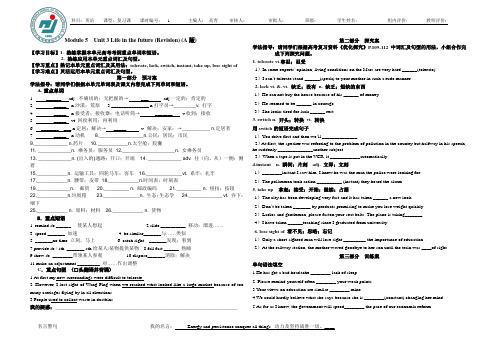
Module 5 Unit 3 Life in the future (Revision) (A版)【学习目标】1. 熟练掌握本单元高考考纲重点单词和短语。
2. 熟练应用本单元重点词汇及句型。
【学习重点】熟记本单元重点词汇及其用法:tolerate, lack, switch, instant, take up, lose sight of 【学习难点】灵活运用本单元重点词汇及句型。
第一部分预习案学法指导:请同学们根据本单元单词表及课文内容完成下列单词和短语。
A.重点单词1. ______ adj. 不确切的;无把握的→___ adj.一定的;肯定的2. _____ n.沙漠;荒原3._______________ n.打字员→________v. 打字4. _____ n.接受者;接收器;电话听筒→_______ v.收到;接收5. _____ vt..回收利用;再利用6. _______ ___ n.定居;解决→_____ v. 解决;安家;→__________ n.定居者7. _____ n.动机8.________________n.公民;居民;市民9.____________ n.药片10.___________n.太空舱;胶囊11. ____________n. 乘务员;服务员12.___________________n. 女乘务员13. ____________n. (出入的)通路;开口;开端14. ____________ adv. 往(向、从)一侧;侧着15.___________n. 运输工具;四轮马车;客车16._____________vt. 系牢;扎牢17.___________n. 腰带;皮带18.___________n.时间表;时刻表19.____________n. 邮资20._________ n. 邮政编码21._________ n. 纽扣;按钮22.___________n.垃圾箱23._____________n. 生态;生态学24.____________ vt. 吞下;咽下25.___________ n. 原料;材料26.___________ n. 货物B.重点短语1. remind sb.______... 使某人想起2.slide __________ 移动;溜进…….3. speed _______ 加速4. be similar_______与……类似5. _______no time 立刻,马上6. catch sight _______发现;看到7.provide sb./ sth. _______ sth.给某人/某物提供某物8.fall fast ______ 熟睡9.show sb. ________带领某人参观10.dispose_______消除;解决11.make an adjustment _________ 对……作出调整C.重点句型(口头翻译并背诵)1.At first my new surroundings were difficult to tolerate.2. However, I lost sight of Wang Ping when we reached what looked like a large market because of too many carriages flying by in all directions.3.People used to collect waste in dustbins.我的疑惑:_________________________________________________________________________第二部分探究案学法指导:请同学们根据高考复习资料《优化探究》P.109-112中词汇及句型的用法,小组合作完成下列探究问题。
人教版必修五英语unit3Grammar导学案.doc
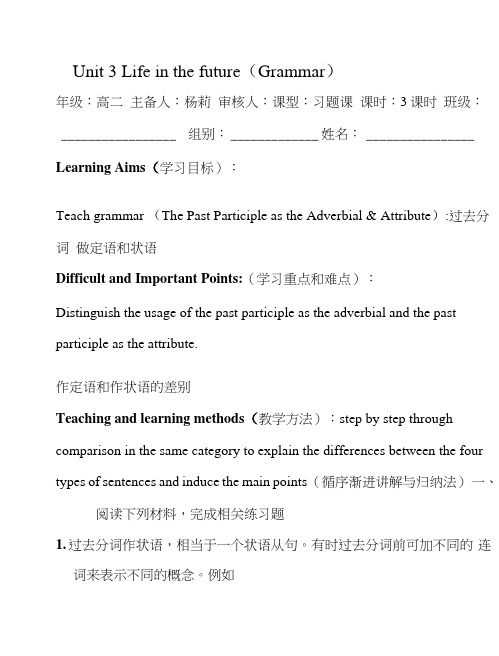
Unit 3 Life in the future(Grammar)年级:高二主备人:杨莉审核人:课型:习题课课时:3课时班级:_________________ 组别:_____________ 姓名:________________ Learning Aims(学习目标):Teach grammar (The Past Participle as the Adverbial & Attribute):过去分词做定语和状语Difficult and Important Points:(学习重点和难点):Distinguish the usage of the past participle as the adverbial and the past participle as the attribute.作定语和作状语的差别Teaching and learning methods(教学方法):step by step through comparison in the same category to explain the differences between the four types of sentences and induce the main points (循序渐进讲解与归纳法)一、阅读下列材料,完成相关练习题1.过去分词作状语,相当于一个状语从句。
有时过去分词前可加不同的连词来表示不同的概念。
例如When heated (When it is heated), ice will be changed into wate匚(时间状语)Given advice by the famous detective (Since/ As she was given advice by the famous detective) , the young lady was no longer afraid.(原因耳犬语) Given more attention (If they had been given more attention) , the cabbages could have grown better.(条件状语)Though tired out (Though he was tired out), he still kept working on his plan until it was finished. (i上步状语The hunter left his house, followed by his dog (and he was followed by his 匹g)・(伴随状语)2.过去分词作状语时,过去分词的逻辑主语与句子主语一致。
人教版高中英语必修5 Unit3 Grammar名师教学设计

(详见附后的教学设计)
教
学
评
价
1.本课时的目标设计清晰可操作,活动的设计紧扣目标要求并与目标达成一致;
2.语法课的活动环节设计遵循语法学习规律,自上而下逐层递进,注重培养学生归纳总结的能力;
3.语法课后的活动设计体现对情景中再现语法的教学策略,注重了对学生运用语法知识能力的培养。
Section 3语法课教学设计
教
学
目
标
语言目标:
1.学生能掌握过分词作定语和状语这一语法现象。
2.学生能准确找到过去分词的逻辑主语,并明确他们之间的被动关系。
语义目标:
1.学生能准确分析过去分词在句中充当的成分(作状语和定语)。
2.学生能熟记,过去分词的巧学口诀。
语用目标:
1.学生能正确理解过去分词作状语和定语的句子。
2.学生能在语境中正确地使用过去分词
步骤
过程
措施(教师活动与学生活动)
目的
持续性评价
DELC1
预备与激活先期知识
Step 1
Leading in(导入…
T: Today we will learn something about how to use the past participle as the adverbial and attribute. Let’s read the passage and underline the sentences which contains past participles.
情感目标:
1.学生能对语法学习变得更感兴趣;
2.学生能逐渐形成通过文本学习主动归纳语法现象的意识。
学习策略:
1.通过分析对比,发现语法现象;
人教版高中英语语法学案必修5Unit3Lifeinthefuture.pdf

话题:学校生活【词汇积累】【佳句背诵】1.personality n.性格;个性2.abundant adj. 丰富的3.first-class adj. 一流的4.habit n. 习惯5.participate v. 参加6.strengthen v. 加强7.virtue n. 美德8.board v. 寄宿9.dormitory n. 公寓10.relaxation n. 放松11.spare no effort 不遗余力12.be accustomed to 习惯于13.concentrate on 集中精力于14.the key to success 成功的关键15.build up one’s body 增强体质16.overcome difficulty 克服困难17.make up one’s mind 下决心18.get into a bad habit 染上坏习惯1.When facing difficulties,I have enough courage to get them over.当遇到困难时,我有足够的勇气克服它们。
2.Only by reading widely can we gain more knowledge and broaden our horizons.只有博览群书,我们才能增长知识开阔视野。
3.When it comes to English learning,I think reading is important.当谈到英语学习时,我认为阅读很重要。
4.I’m determined to do well in my lessons so as not to let my parents down.为了不让我的父母失望,我下决心把功课学好。
【写作模板】学习习惯It’suseful and necessary to discuss learning habits.As the old saying goes, “Success lies in good habits.”If we form a good learning habit,the chances that we’ll gain doubled efficiency with less time wasted are very good. When it comes to good learning habits,I think reviewing our courses after class is of vital importance.To do this, we are supposed to set aside some time every day to fix our attention on where we don’tunderstand.It is repeating what we’ve learned that strengthens our memories and leads to better school performance. However,no one can afford to ignore his shortcomings and I’m no exception. I always find myself occupied in taking notes without noticing teachers’ words,which has been a heavy burden to my study.For the sake of better result,I’m focusing on the key points and seizing every chance to keep pace with teachers.By doing so,I’m firmly convinced that I can achieve it.。
必修5 unit3_知识点学案版
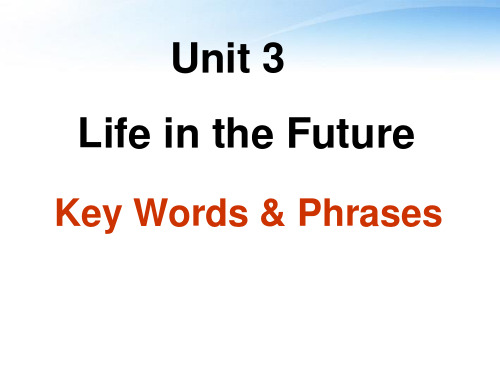
After his wife’s death, it took him two years to get back on his feet.
9. lose sight of 看不见,忽视,失去联系
阅读下列句子,观察lose sight of 的意思和 用法。 1. Suddenly I lost sight of my father in the crowd. 2. We must not lose sight of the fact that learning English is very important. 3. I have lost sight of my best school
even though going to school _____
most of his day.
A. takes up
B. makes up
C. saves up
D. puts up
2. My old friend invited me to attend his
wedding and I _____ the invitation.
vt. surround 包围;围绕 be surrounded with/by 被···包围
③ They lived in a house surrounded by trees, and most of the trees surrounding the house were pine trees.
6. lack vi. & vt. 缺乏;没有
n. 缺乏;短缺的东西
1. She lacks money to buy new clothes. 2. He is lacking in confidence. 3. She does not lack for friends. 4. Poor as he is, he still thinks that he lacks for
(完整word版)高二英语人教版必修五Unit3教学设计教案
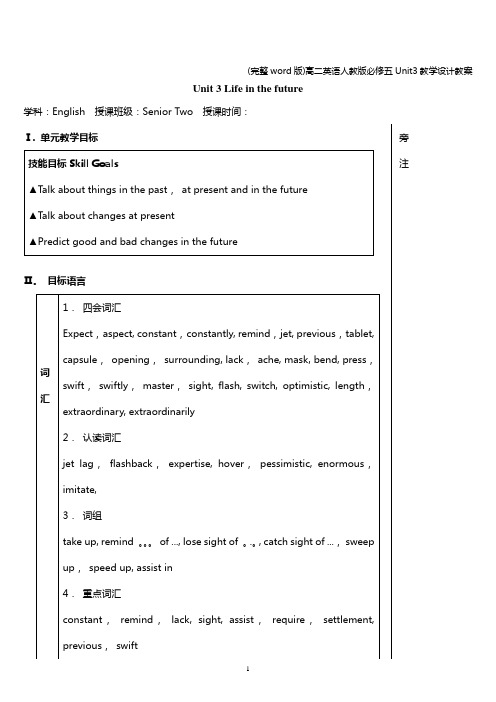
Unit 3 Life in the future 学科:English 授课班级:Senior Two 授课时间:Ⅰ. 单元教学目标Ⅱ。
目标语言旁注Ⅲ. 教材分析与教材重组1. 教材分析本单元以“Life in the future”为中心话题,旨在通过本单元的学习,让学生大胆发挥想象,对人类今后的生活环境,生活方式进行猜测,并在此基础上,对人类的种种活动进行反思,提倡环保生活意识.同时让学生学会过去分词作定语和作状语的不同用法。
最后让学生将本单元所讨论的话题和推测手法相结合,学习怎样写report。
1。
1 Warming Up 部分利用一个关于“住”和“行"的对比研究表格引导学生回顾过去,认识现在和展望未来。
通过这一活动,引发学生对过去,现在和未来的思考,使学生对将要阅读的文章有个知识准备。
1.2 Pre-reading 部分让学生充分运用发散思维,先列举当今世界人类面临的一些突出问题,然后要求学生思考为什么会产生这些问题,这些问题中哪些在未来社会仍然可能存在,哪些将会被克服,哪些将会恶化。
为下面的阅读做了铺垫。
1.3 Reading 部分通过一封发自未来的电子邮件,讲述了作者Li Qiang怎样安全到达“未来世界",他对“未来世界”的印象,以及“未来世界”的日常生活方式和交通工具情况.阅读时要把重点放在“未来世界”生活与当今生活的不同点上。
1。
4 Comprehending 部分设计了三个教学活动来加深学生对Reading部分的理解。
第一个活动要求学生通过阅读找出“未来世界"在以下几个方面的变化:跨时空旅行,交通,住房,城镇环境和空气质量.接着让学生在此基础上得出自己的结论,哪些变化好,哪些变化不好,并说明理由。
第二个活动要求学生通过阅读来判断Li Qiang对“未来世界”的态度是乐观的还是悲观的。
学生要在文中找出支持自己观点的论据,尽可能说服别人。
第三个活动让学生想象一下Li Qiang将会去参加哪些活动。
必修5第3单元学案

Unit 3 Life In the Future本单元的中心话题是“谈未来”,内容主要涉及人类对今后生活环境的想象、猜测和思考。
通过本单元的学习,要让学生大胆发挥想象,对人类今后的生活环境,学案一Warming Up, Pre-reading and comprehending Teaching Goals:1.To illustrate Ss’ imaginatio n of future life.2.To arouse Ss to pay more attention to the problems that probably appeared in thefuture life.3. Enable the students to describe the life in the past, at present and in the future. Step 1 Lead-indiscuss the question :What do you think future life will be like?Step 2. Warming UpWhat changes do you expect to see in your life in 50 years’ time? In groups, choose two of them to have a discussion, then make notes in the table.Step 3. Pre-readingdiscuss the following questions in pairs.(1)Make a list of the problems human beings are facing today.(2) Which problems do you think people will have overcome in one thousand years? Which ones do you think will still exist in AD 3008?Step 4 homework: 做双语报第4期b1版的主题阅读ReadingTeaching aims:1.To train the students’ reading ability2.Grasp some important phrases and sentences3.Stimulate the students’ interest and love for learning life in the future.Step 1: PredictionLook at the pictures on page18 and the title of the passage and predict the content.What do you think the passage will tell us?Step 2:skimming1. What’s the text about?( )A.An e-mail written by a man who has taken up a trip to the futureB. The man has his first try to master a hovering carriage.C. The man is surprised at the Wang ping’s home.D. The preparation of the trip.2. match the main idea of each paragragh.Paragragh 1 The journey.Paragragh 2 Staying in Wang Ping’s home.Paragragh 3 How I came to take a time travel journey.Paragragh 4 My impressions of life one thousand years into the future. Step 3:scanning1. Do exercise1. on page 192. True or False1. During his journey he suffered from “jet lag”.2. Wang Ping was his friend as well as his guide.3. The writer gave Wang Ping some green tablets, which helped a lot.4. Wang Ping owns a company named “Future Tours”.5. Before the trip, we had a calming drink which made us sleepy.6. I lost sight of Wang Ping because there were too many carriages.7. In the year AD 3008, the air in private houses was poor quality.8. Hovering carriages were a fast means of transport, and people could fly in them in every direction.Step 4.Homework: Read the text loudly and find some difficult sentences.学案二Language points1. First impressions.impression: n.___________________eg. She gives the impression of being very busy.I had a very good impression on him.The new teacher made a good impression on the students.His trip to India left a strong impression on him.常用结构:___________________________________________vt. 给……留下深刻的印象;使铭记The teacher impressed us with his sense of humour.He impressed on us the need for immediate action.常用结构:______________________________________________________________________________________________ 做一做:1)______________________________ was favourable.他给我的第一印象不错。
必修五Unit3 知识点学案Microsoft Word 文档

必修五Unit3 Life in the future Language Points 知识点学案1.First impressions.第一印象(1)impress vt. 给某人留下印象impress sb with sth 使某人铭记......The teacher impressed us with his sense of humor.(2)impression: n. [C] 印象give sb. a good impression给某人以好印象leave/make an impression on sb.给某人留下印象这演说给我们留下了深刻的印象.The speech __________________________ on us.2.take up vt(1)接受(建议或挑战)He took up the challenge with courage.(2)拿起;举起She took up a pen.(3)占据时间或空间This piano takes up too much space/room.(4)开始从事某一职业或对某物感兴趣After graduation from college, he took up medicine as a doctor.扩展:以动词take为中心的短语动词:take off脱下,起飞,成功take on雇佣,呈现,接受take out拿出,去掉,扣除take over 接管,接任,占据take down取下,记下,拆卸take in接纳,吸收;领会,理解;欺骗take away拿走,带走,去除take back取回,收回,退回以副词up 为中心的短语动词:sweep up打扫,横扫,席卷speed up使加速look up向上看,查阅make up编造,组成,化妆,弥补pick up捡起,开车去接某人,无意中听到、学会,接收(信号),廉价地买到put up 举起,张贴turn up出现、到场,把音量调大3.tolerate vt. 忍受; 容忍toleration [U]I can't tolerate your bad manners any longer. 我再也不能容忍你无礼的行为。
人教版高中英语必修5 Unit3 Grammar 优秀学案

Unit3 Grammar 优教学案学习目标1. To master the basic usages of the Past Participle as the adverbial and attribute.2. To learn to use the Past Participle as the adverbial and attribute in the real situation through self-study and practice.3. To be interested in English study and enjoy the beauty of English.学习过程过去分词是非谓语动词的一种形式, 表示完成和被动的动作。
它在句子中可以充当状语、定语等成分。
Step 1:过去分词作状语1. When heated, ice will be changed into water. (过去分词作状语)2. Done in a hurry, his homework was full of mistakes. (过去分词作状语)3. Given more attention, the cabbages could have grown better. (过去分词作状语)4. The hunter left his house, followed by his dog. (过去分词作状语)【辨析】过去分词与现在分词作状语过去分词表、, 与主句主语之间是被动关系;现在分词表、, 与主句主语之间是主动关系。
如果一个被动的动作发生在谓语动词之前, 则可使用现在分词的完成被动式或过去分词。
Following the old man, we went upstairs. 跟着那个老人, 我们上楼了。
Followed by the old man, we went upstairs. 被那个老人跟着, 我们上楼了。
高中必修选修学案必修3,UNIT 5语法导学案(新)
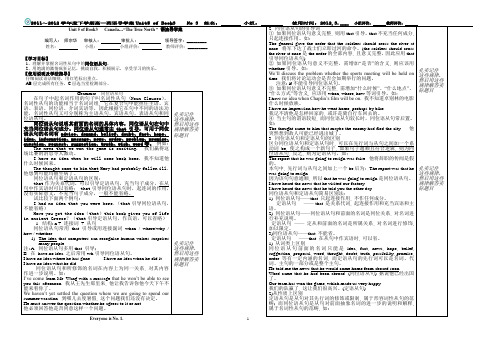
Unit 5 of Book3 Canada---“The True North ”语法导学案编写人:师宗华审核人:审批人:领导签字:_________姓名:小组:小组评价:教师评价:_________ 【学习目标】1、理解并掌握名词性从句中的同位语从句。
2、用饱满的激情疯狂记忆,挑战自我,积极展示,享受学习的快乐。
【使用说明及学法指导】仔细阅读语法细则,用红笔标出重点。
AB层完成所有任务,C层选当堂检测部分。
Grammar 同位语从句在句子中起名词作用的句子叫名词性从句 (Noun Clauses)。
名词性从句的功能相当于名词词组, 它在复合句中能担任主语、宾语、表语、同位语、介词宾语等,因此根据它在句中不同的语法功能,名词性从句又可分别称为主语从句、宾语从句、表语从句和同位语从句。
同位语从句说明其前面的名词的具体内容,同位语从句在句中充当同位语从句成分。
同位语从句通常由that引导,可用于同位语从句的名词有advice、demand、belief、doubt、fact、hope、idea、information、message、news、order、problem、promise、question、request、suggestion、truth、wish、word等。
例如:The news that we won the game is exciting. 我们赢得这场比赛的消息令人激动。
I have no idea when he will come back home. 我不知道他什么时候回来。
The thought came to him that Mary had probably fallen ill. 他想到可能玛丽生病了。
同位语从句和定语从句的区别:that作为关系代词,可以引导定语从句,充当句子成分,在从句中作宾语时可以省略; that引导同位语从句时,起连词的作用,没有实际意义,不充当句子成分,一般不能省略。
江苏省大丰市新丰中学高中英语必修五Unit 3 grammar 导学案

Unit 3 grammar班级:姓名:学号:一、明确目标,自主学习1. 教学目标:(1)To review the usage of some verb-ed and verb-ing(2)To learn how to use some verb-ed and verb-ing in different situations(3)To apply what they have learnt to practice by fulfilling some written tasks二复习v-ing形式及预习复习:v-ing形式(1)v-ing形式作定语1. 单个的v-ing形式可以作前置定语,表示所修饰的人或物的动作或状态,在意思上接近一个定语从句,可以表示正在进行的动作,也可表示经常性动作或当时的状态。
developing countries = countries that are developing 发展中国家an ordinary-looking house = a house that looks ordinary 看起来很普通的房子a puzzling problem = a problem that puzzles somebody 困扰人的问题2. 作定语的v-ing形式如是一个短语,则应放在被修饰词的后面。
The bottle _______ _________ should be sent to the laboratory.= The bottle which contains vinegar should be sent to the laboratory.They lived in a house facing south.. = They lived in a house_____ _______ ______.(2)v-ing形式作状语动词-ing形式可以作状语,修饰动词,其动作执行者常与句子主语是主动关系。
人教版必修五Unit 3 life in the future language points学案
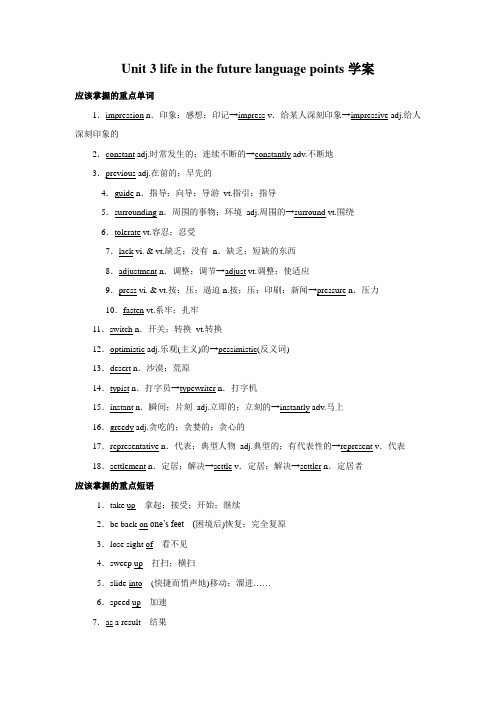
Unit 3 life in the future language points学案应该掌握的重点单词1.impression n.印象;感想;印记→impress v.给某人深刻印象→impressive adj.给人深刻印象的2.constant adj.时常发生的;连续不断的→constantly adv.不断地3.previous adj.在前的;早先的4.guide n.指导;向导;导游vt.指引;指导5.surrounding n.周围的事物;环境adj.周围的→surround vt.围绕6.tolerate vt.容忍;忍受7.lack vi. & vt.缺乏;没有n.缺乏;短缺的东西8.adjustment n.调整;调节→adjust vt.调整;使适应9.press vi. & vt.按;压;逼迫n.按;压;印刷;新闻→pressure n.压力10.fasten vt.系牢;扎牢11.switch n.开关;转换vt.转换12.optimistic adj.乐观(主义)的→pessimistic(反义词)13.desert n.沙漠;荒原14.typist n.打字员→typewriter n.打字机15.instant n.瞬间;片刻adj.立即的;立刻的→instantly adv.马上16.greedy adj.贪吃的;贪婪的;贪心的17.representative n.代表;典型人物adj.典型的;有代表性的→represent v.代表18.settlement n.定居;解决→settle v.定居;解决→settler n.定居者应该掌握的重点短语1.take up拿起;接受;开始;继续2.be back on one’s feet (困境后)恢复;完全复原3.lose sight of 看不见4.sweep up 打扫;横扫5.slide into (快捷而悄声地)移动;溜进……6.speed up 加速7.as a result 结果8.be similar to... 与……相似9.in all directions 向四面八方10.show...around... 带领某人参观应该掌握的重点句型1.At first my new surroundings were difficult to tolerate.起初,我的新环境很难忍受。
高二英语必修5模块3语法讲解教案

高二英语必修5 模块 3 语法讲解教案直接引语转换成间接引语的规则引述或转述别人的话称为“引语”。
直接引用别人的原话,叫作直接引语,用自己的语言转述别人的话,叫作间接引语。
直接引语用引号标出,而间接引语不需要引号。
直接引语为陈述句。
一般疑问句,特殊疑问句,和祈使句,转换成间接引语时,句子的结构,人称,时态,时间状语和地点状语都有变化。
1.人称的转变直接引语转化成间接引语时,人称要根据情况作必要的变化。
She said , “I am very sorry.”----- She said that she was very sorry.“ You should be more careful next time,” my father told me.---- My father told me that I should be more careful the next time.He said to his son, “I’ll check your homework tonight.”----- He said to his son that he would check his homework that night.2. 时态的转换直接引语改为间接引语时,主句的谓语动词如果是过去时,从句(即间接引语部分)的谓语动词在时态方面要作出相应的变化,变成过去时范畴的各种时态(实际也是宾语从句的时态要求)。
3.时间状语,地点状语及某些对比性的指示代词和动词的变化。
4.直接引语变成间接引语时,从句时态无须改变的情况。
1)直接引语表述的是客观事实。
科学真理和格言时,例如:The teacher said “ The earth moves round the sun.”---- The teacher said that the earth moves round the sun.He said, “ Practice makes perfect.”----- He said that practice makes perfect.2) 主句的时态是一般现在时、现在进行时或一般将来时时。
2022年人教版高二英语必修五Unit 3 Life in the futureGrammar 学案
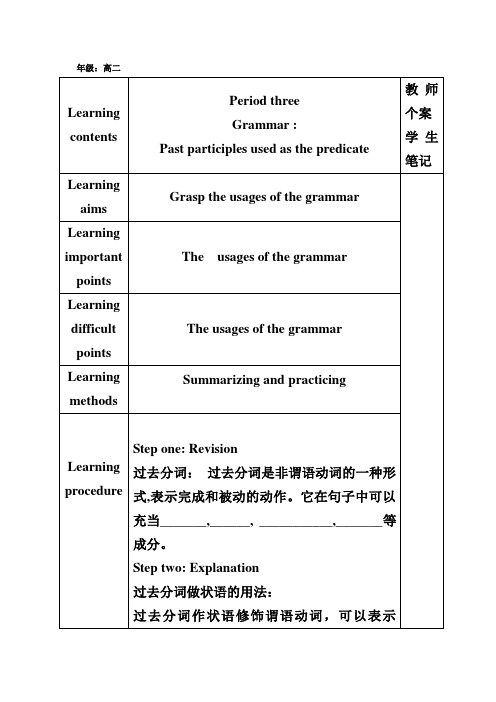
另外,分词作状语时,如果其逻辑主语与整个句子的主语不一致时,需要独立主格结构或with复合结构来替代。
The signal given, the bus started.
信号一发出,汽车就开动了。
〔the signal是given的逻辑主语,因此主句主语the bus就不是given的逻辑主语。〕
1.过去分词作时间状语
Seen under a microscope, a fresh snowflake has a delicate〔精美的〕shape.
When it is seen under a microscope, a fresh snowflake〔雪花〕has a delicate shape.
Step one:Revision
过去分词:过去分词是非谓语动词的一种形式,表示完成和被动的动作。它在句子中可以充当_______,______, ___________,_______等成分。
Step two: Explanation
过去分词做状语的用法:
过去分词作状语修饰谓语动词,可以表示_____、____、____、_____、________或________等,在意义上相当于状语从句。
4.表示让步
表示让步,相当于although/though引导的让步状语从句.
Laughed at by many people, he continued his study.
=Though he was laughed at by many people, he continued his study.
given…倘假设……;假定…
4.“பைடு நூலகம்词+过去分词〞作状语
- 1、下载文档前请自行甄别文档内容的完整性,平台不提供额外的编辑、内容补充、找答案等附加服务。
- 2、"仅部分预览"的文档,不可在线预览部分如存在完整性等问题,可反馈申请退款(可完整预览的文档不适用该条件!)。
- 3、如文档侵犯您的权益,请联系客服反馈,我们会尽快为您处理(人工客服工作时间:9:00-18:30)。
必修五Unit3 Life in the future Grammar 语法学案The Past Participle (3) as the Adverbial
在前两个单元我们讲解了过去分词作定语和表语、宾语补足语本单元我们将继续学习过去分词作状语。
观察下面的句子:Once published, his works became famous for the absence of rhyme at the end of each line.
=Once his works was published, his works became famous for .........
PP作时间状语, 相当于一个时间状语从句。
一:过去分词作状语, 表示被动的动作或动作已经完成。
过去分词通常可作: 1.时间状语:时间状语可在过去分词前加上连词when, while, until, once等来强调时间概念。
例句:(1). When it is seen from the hill, the park looks very beautiful.
=(When)Seen from the hill, the park looks very beautiful.
(2)Don’t speak until you are spoken to.
=Don’t speak until _______________.
2. 原因状语
(3). Because the boy was greatly touched by his teacher’s words, he did a lot of things to help his classmates.
=Greatly touched by the teacher’s words, he did a lot of things to help his classmates.
(4).As he was surprised at what happened, Tom didn’t know what to do.
=_________________________________, Tom didn’t know what to do.
3. 条件状语:可在过去分词前加上连词if或unless
(5). If we were given more time, we could do it much better.
=(If)Given more time, we could do it much better.
(6). If it is heated to a high temperature, water will change into vapor.
=(If)_____________________________, water will change into vapor.
(7)Unless I am invited, I won’t go to the party.
=Unless____________, I won’t go to the party.
4. 让步状语:可在过去分词前加上连词though或even if
(8). Though they had been warned of the storm, the farmers were still working in the fields.
=(Though) warned of the storm, the farmers were still working in the fields.
9.Even if I’m invited, I won’t take part in the party.
=Even if____________, I won’t take part in the party.
5. 伴随状语
(10).The teacher entered the classroom, and he was followed by a group of students.
=The teacher entered the classroom, followed by a group of students.
(11)The teacher stood there and was surrounded by some students.
The teacher stood there, _________________________________.
二:过去分词作状语时注意的问题:过去分词有两大特点:
1. 表示被动的动作;
2. 表示已经完成的动作, 因此, 当过去分词作状语的时候一定要搞清楚分词与主语的逻辑关系——被动。
3. 过去分词作状语时,过去分词的逻辑主语与句子主语一致。
比较以下两组句子(1). Following the old man, we went upstairs.
(We followed.....)(跟着那个老人, 我们上了楼。
)
(2). Followed by the old man, we went upstairs.
(We were followed by......) (我们上了楼, 后面跟着那个老人。
)
(3). 从上面看, 体育场好像一个鸟巢。
______ from the top, the stadium looks like a bird nest. A. Seeing B. Seen
(4). 从太空看, 宇航员看不到长城。
_______ from space, the astronaut can
not discover the Great Wall. A. Seeing B. Seen
语法自测: Fill in the blanks using the correct form of the verbs
(1)__________(give) more time, we would be able to do the work much better.
(2)________(do) in a hurry, his homework was full of mistakes.
(3)When __________( heat), ice will be changed into water.
(4)The ____________(follow) morning, the father came into the lonely house.
(5)The hunter left his house, ____________(follow) by his dog.
(6)_________(leave) alone at home, Sam did not feel afraid at all.
(7)________(ask) what had happened, he told us about it.
(8)Well __________(know) for his expert advice, he received many invitations to give lectures.
(9)Deeply____________( interest) in medicine, she decided to become a doctor.
(10)___________(worry) about the journey, I was unsettled for the first few days.
(11) ___________(beat)black and blue, the lady couldn’t move.
(12)_________(see) these pictures, I couldn’t help thinking of those days when I was in Beijing.
(13)__________(see) from the top of a thirty-storeyed(层) building, Beijing looks more magnificent.。
